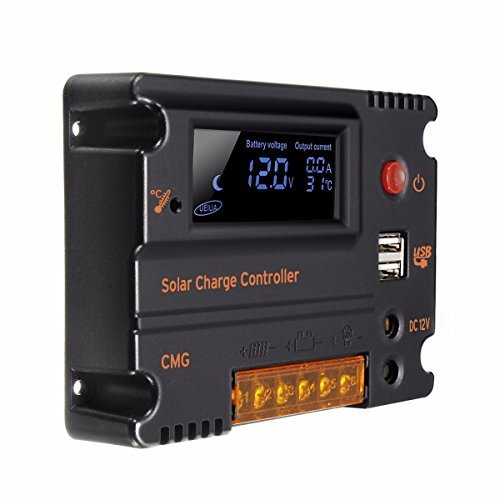
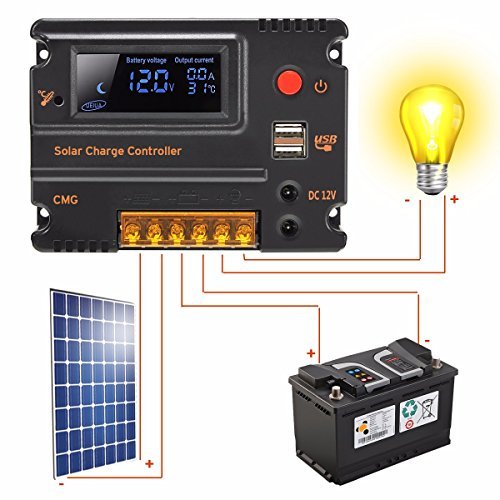
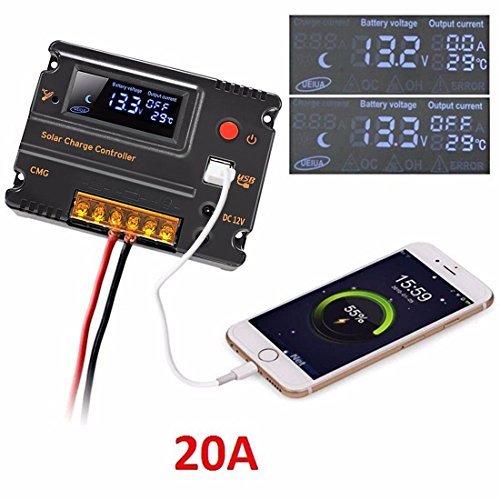
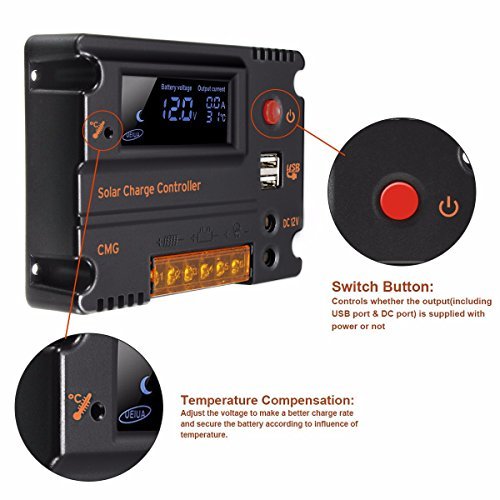
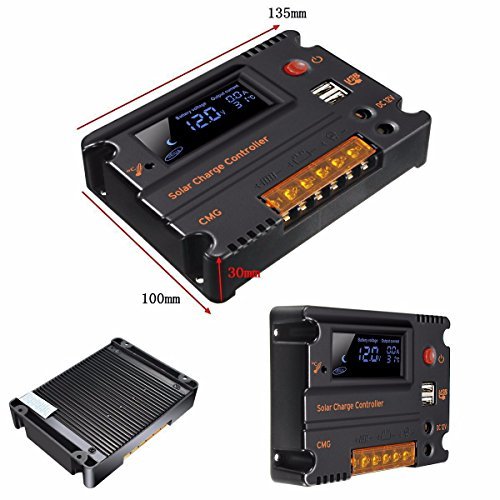
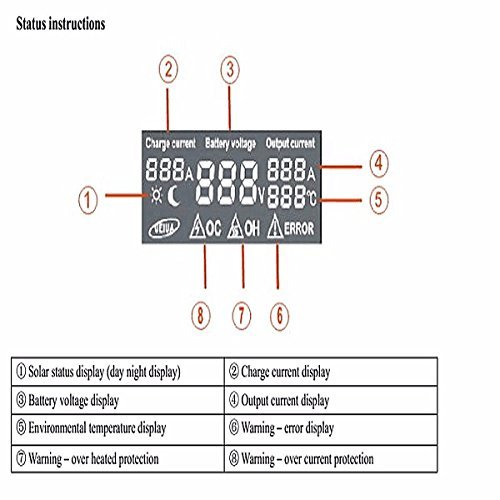
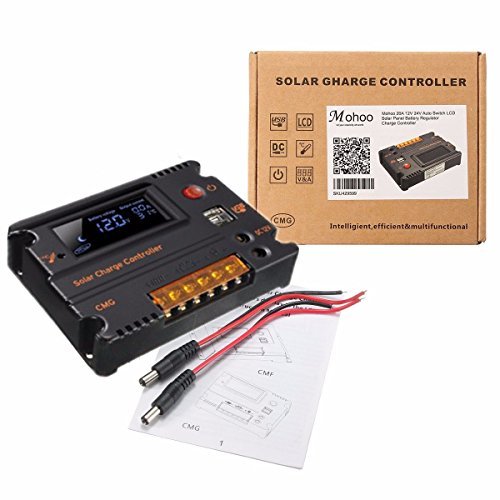







Color:20A Auto Solar Panel Note: Please connect to the battery first and then the panel. Specification: Model: CMG-2420 Rated Discharge Current: 20A USB Output Voltage: 5V Total USB Output Current: 3A DC Output Voltage: 12V
Total DC Output Current: 2A Over Load, Short Circuit Protection: 1.5 times by rated current Short Circuit Recovery Time: 10s Open Circuit Voltage of Solar Panel: 40V No load loss: 0.05W Over Voltage Protection: 15V;×2/24V Float Chager Voltage: 14V;×2/24V Discharge Recovery Voltage: 12V;×2/24V Over Discharge Voltage: 10.5V;×2/24V Control Mode: Software Intelligent Control Working Temperature: -35 Degree~+55 Degree Dimension(L×W×H): 135 X 100 X 30 mm
Protection: 1. Over-load protection 2. Short circuit protection 3. Lightning protection 4. Under-voltage protection 5. Over-charging protection 6. Reverse Polarity protection
Features: Wide LCD screen display With output switch, intelligent control, easy to operate. Power-efficient,Microcontroller digital accuracy PWM charging mode(SOC) Available for DC lamp and phone charging Use PWM&WPC mode, improve system efficiency and prolong the life span of the battery. Package included: 1 x Solar Charge Controller 1 x User Manual 2 x DC Cable
Installed this 20 amp controller on an RV with a 100 watt panel on the roof and two 6-volt high capacity batteries in series (for 12 volts). I was using a very basic “yellow light on, charging - green light on, full” controller, but it was barely big enough to handle the 100 watt panel. It came with a 50 watt panel that I replaced when it died. The controller would overheat and shut down for a minute or two when the panel was in full sun, then come back on for a few minutes. I figured I was wasting charging time and looked in to a replacement that was rated for higher capacity. The 20 amp seemed like a good size since I could easily add another 100 watt panel later if I decide to.I really like the digital readout on the unit. Easy to see exactly what’s going on. It is compact, and mounted easily. Very easy to hook up. I have nothing wired to the “load” outlet terminals, but have used the USB outlets to charge phones, and they work perfectly. Nice looking controller, and back lit well enough to see in daytime. The only complaint with the display is that you must be looking straight-on to see the LCD properly, and since mine is mounted at about waist-level, you have to stoop to see it unless standing back a bit. Not a big deal, however.One thing that is a little confusing, and the reason for dropping a star from the rating, is that unless the panel has fairly direct sunlight, it shows no charging current. If the sun goes behind a cloud, it drops to zero. The display shows “daylight” (the sun icon), so it knows it is daytime, but the controller sends no current to the batteries. I’d understand it dropping some, but why can’t partial sun give a partial charge level? It was really surprising to watch how quickly it drops off when shade from a tree limb blocks part of the panel, or a cloud covers the sun. When the sun is high in the sky and bright, the controller is sending a nice amount of energy to those batteries, but there is a lot of time during the day that you get nothing, or almost nothing. A bit disappointing, for sure. It may be that the other controller was only actively charging a similar amount to what this one is, but didn’t know it since the display was so basic. I still wish it could provide at least a trickle of power at times I feel it definitely should be.As a whole, this controller seems to be doing its job well, and I like the fact that it gives so much information. I also like that it does not switch off and on like the old one. It does not even get warm when operating, so I know it can handle much more than I’m asking of it.
Great little controller with excellent feedback on crucial data. I use these with small 50 watt and 100 watt panels for portable solar generator builds, small charging stations, small RV applications, etc. The only improvement I would make is slightly larger connection points allowing for better connectors, but I simply solder the wires into a split ‘V’ to limit fraying and wrap around the connection screw. The USB and extra 12V ports are a huge plus for my applications. If you’re adding more than a couple panels, I would go with something rated for higher amps, but for uses they are perfect. They seem to recognize the difference between AGM and GEL style batteries as well…but I’m only basing that on the ‘float charge’ patterns and cutoff levels.
Really deliberated for weeks about choosing PWM or MPPT and decided to go with a high end well reviewed PWM controller that leaves room for growth. This unit had a nice built in display that tells me what’s going on with the panels, the battery, and the draw on the load circuit. I can add devices and watch the changes in draw real time. ( This is being written a few days after installing.) It was more compact than I thought but appears well built. Not much room between the wire terminals so I soldered some solid wire pieces onto the stranded 10 gauge ends that would not fit inside. This has worked well but would recommended keeping bare wire to a minimum. I mounted it to my basement office wall where the cable comes in (20 feet from the panel.) and used faucet washers as spacers so the back would not be flush with the wall. So far it is not getting hot. With one 100 Watt Polycrystalline panel the unit is pushing out up to 5.5 amps in full sun which clears a tree around noon and takes the 108 amp hour deep cycle battery up to the float voltages of 14.2 or greater by 4-5 p.m. (July). The default voltage controls seem appropriate and fortunately the unit is largely self explanatory because the manual is not well translated and has some confusing errors and statements in it. The Load circuit for instance is NOT limited to 2 amps but will go up to 6 or 7 amps so far and I expect it would handle 20 amps before cutting off. Volts and Amps are transposed in places. The battery voltage displayed is probably only accurate to gauge remaining capacity while the load circuit is off. It will obviously read lower as the draw exceeds the panel input. It will cutoff around 10.5 - 11 volts or so but automatically turns back on when the battery recovers. I awaken to it (at or before dawn) with the battery at 12.0 to 12.1 volts with 0.6 to 0.9 amps draw on led lighting through the night. Unit itself does not seem to use much power so it’s well suited for smaller systems. Manual instructions have one hooking up the battery and load before connecting panel power but makes no cautionary statements about not doing it in that order. Some controllers can be fried by hooking up active panels before the battery. I will still eventually get an MPPT controller but this PWM unit is good for for my present setup and it is managing the battery in a way that will extend its useful life. REALLY like the USB ports. It’s worked well for my MP3 recorder/player and smartphone.
Hooked up to a set of 6 Harbor Freight 15 watt panels and a EverStart 845MCA group 29 deep cycle marine battery bought at Walmart. It’s a semi clear day and according to the controller, the panels are producing 5-6 amps. I hooked up 2 12V 5 watt light bulbs into the two outlets provided using the wires that came with the controller. Then I plugged my iPhone and a supplementary battery pack into the two USB ports. I then plugged a 400 watt Inverter to the 12V output. I then plugged in a big Milwaukee work radio radio and a lamp with a 14watt fluorescent into the Inverter. All the plugs and controls are working properly. I will F/U with this review as I get to push it harder and see what it’s limits are. As for now, it gets five stars. It arrived very quickly and well packaged.
so far so good
Works like advertised.
I bought one of these to upgrade from an old 10amp controller. I liked the information shown on the screen.
So far its working well for a 12v system I am switching everything over to 24v.
excelente
Unfortunately I didn’t get this installed in time (a week to late) to find out the amp input just blinks with random numbers with full sun.Mohoo 20A 12V 24V Auto Switch LCD Intelligent Solar Panel Battery Regulator Charge Controller Overload Protection Temperature Compensation
bought Dec. 31 and didn’t hook it up till april. It didn’t work. no power going from panel to battery. sent email to company. whoever they are. no reply and no help.
This looked good but I sent it back cause it does not have a function to turn the load on at dark and it did not read amps from the solar panel
Excellent product and delivery
comments powered by DisqusWorks great better then the one I got with the kits.